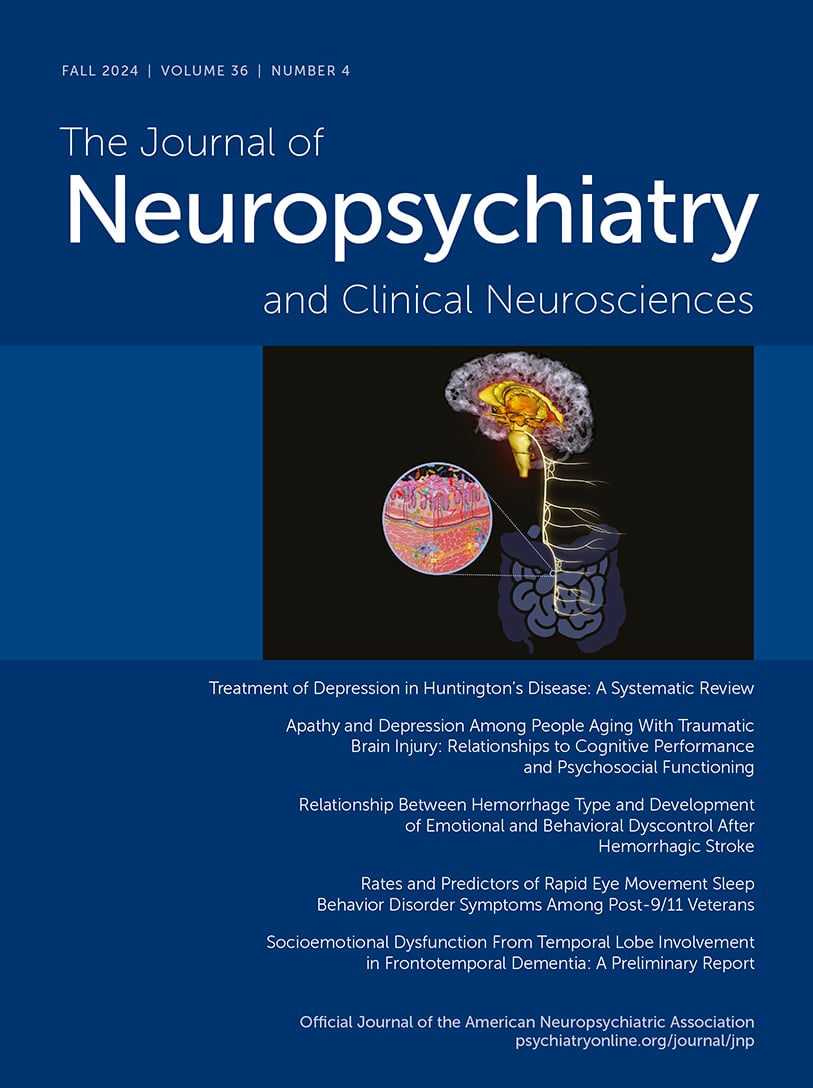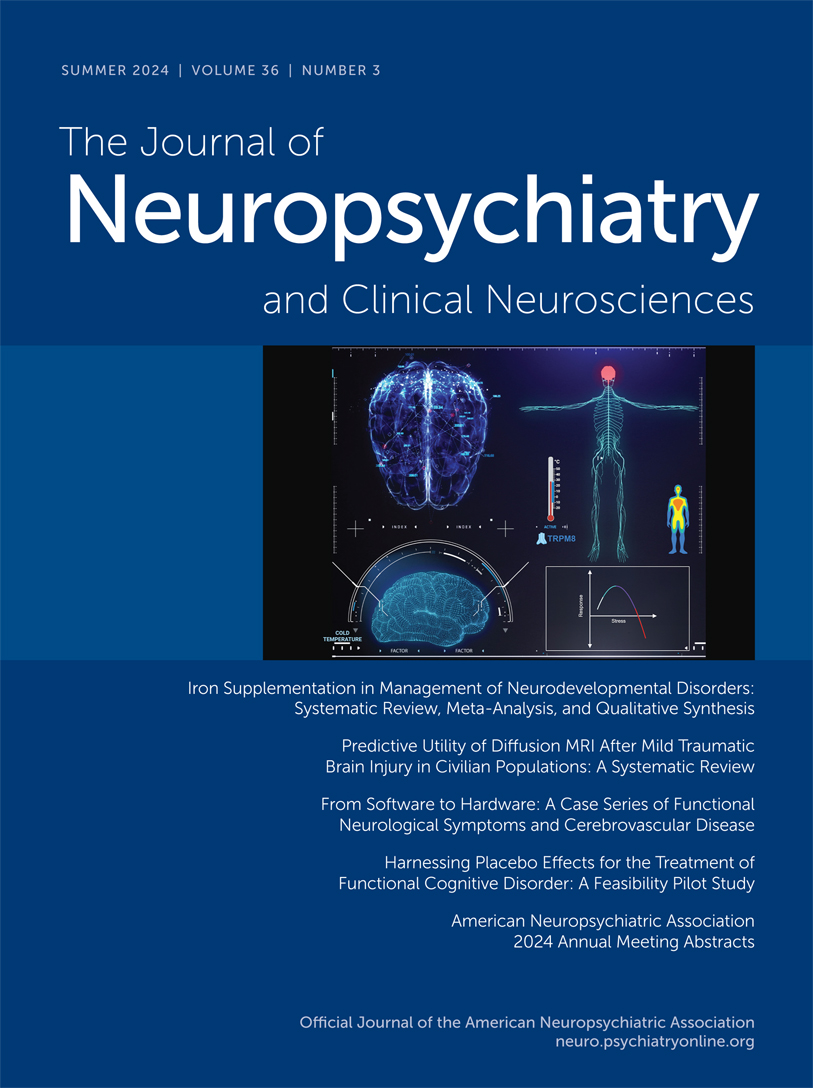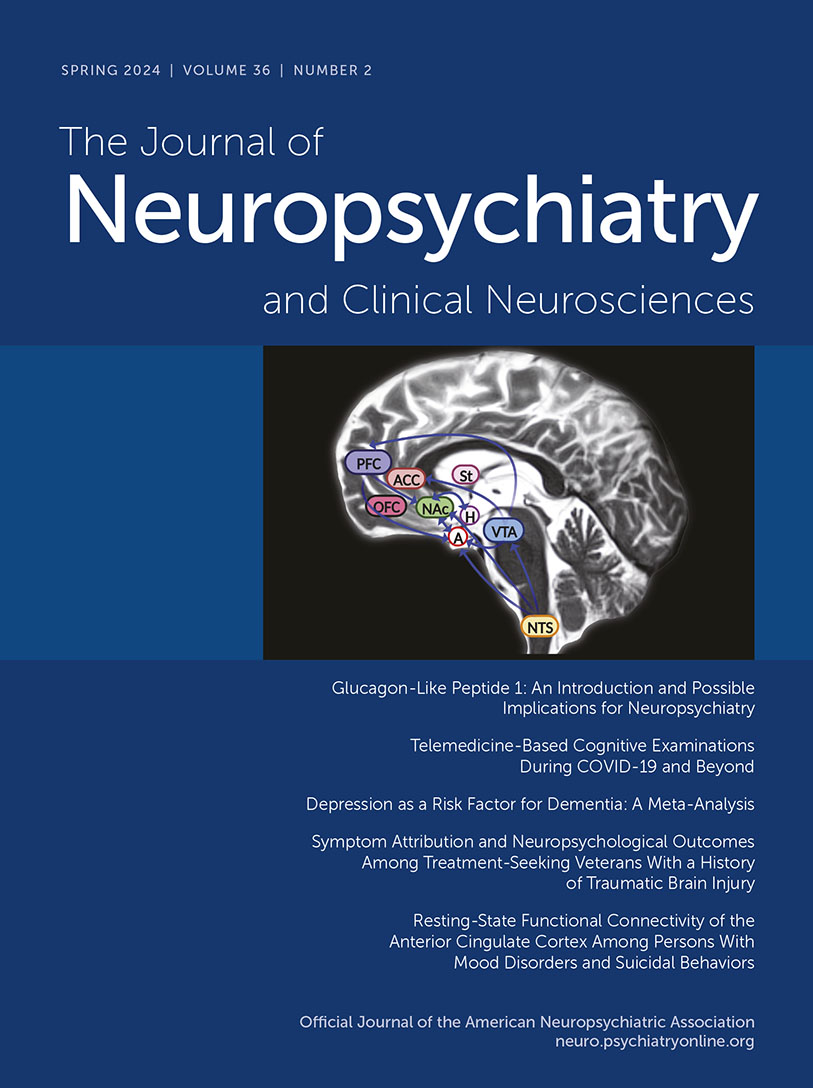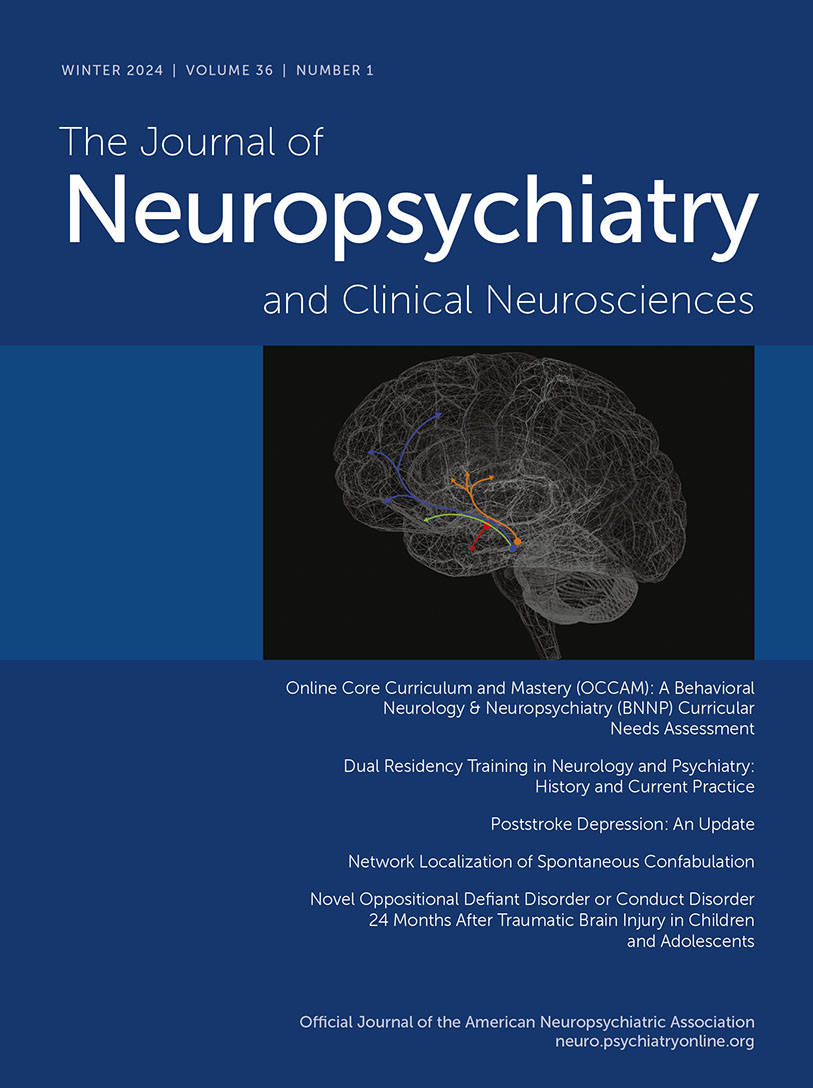The Journal of Neuropsychiatry and Clinical Neurosciences
- Volume 14
- Number 1
- February 2002
Windows to the Brain
Special Article
Publication date: 01 February 2002
Pages6–10Déjà vu experiences are common in normal subjects. In addition, they are established symptoms of temporal lobe seizures. The author argues that the phenomenon is the result of faulty and isolated activity of a recognition memory system that consists of ...
https://doi.org/10.1176/jnp.14.1.6Regular Article
Publication date: 01 February 2002
Pages11–18To estimate the prevalence of, and develop norms for, significant agitation in community-dwelling persons with Alzheimer's disease (AD), the authors applied three different criteria to persons with AD (n=235) and normal elderly control subjects (NEC; n=64)...
https://doi.org/10.1176/jnp.14.1.11Publication date: 01 February 2002
Pages19–24Positron emission tomography ([15O] water PET) was used to examine the relationship between age and regional cerebral blood flow (rCBF) in schizophrenia. Forty-nine unmedicated male patients, ages 20–51, underwent imaging during an eyes-closed resting ...
https://doi.org/10.1176/jnp.14.1.19Publication date: 01 February 2002
Pages25–30The relationship between posttraumatic amnesia (PTA) and symptoms of posttraumatic stress disorder (PTSD) was examined in 282 outpatients at a mean of 53 days after traumatic brain injury (TBI). Patients were assessed for TBI severity, intrusive and ...
https://doi.org/10.1176/jnp.14.1.25Publication date: 01 February 2002
Pages31–36This study compared the performance of Parkinson's disease (PD) patients with and without depression, patients with depression alone, and normal control subjects on a cognitive screening instrument, the Mattis Dementia Rating Scale (DRS) to evaluate the ...
https://doi.org/10.1176/jnp.14.1.31Publication date: 01 February 2002
Pages37–43The authors examined the relationship of three dimensions of behavioral change (Apathy, Depression, and Irritability) measured by the Problem Behaviors Assessment for Huntington's Disease (PBA-HD) to cognitive and motor indices of disease severity. The ...
https://doi.org/10.1176/jnp.14.1.37Publication date: 01 February 2002
Pages44–51The association between regional measures of cortical atrophy and neuropsychological (NP) dysfunction was studied in 35 multiple sclerosis (MS) patients. Patients underwent neurological examination, MRI, and NP testing. Blind quantitative MRI analysis ...
https://doi.org/10.1176/jnp.14.1.44Publication date: 01 February 2002
Pages52–57This study explored the proposition that denial of addiction is often more a product of cognitive failure due to cerebral dysfunction than an emotion-driven rejection of the truth. Forty-four subjects were studied in an inpatient alcohol rehabilitation ...
https://doi.org/10.1176/jnp.14.1.52Publication date: 01 February 2002
Pages58–63Deficits in delayed recall of learned information may be an early marker of Alzheimer's disease (AD). The apolipoprotein E E4 allele and a positive family history (FH) are both genetic risk factors for AD. The authors cross-sectionally compared ...
https://doi.org/10.1176/jnp.14.1.58Publication date: 01 February 2002
Pages64–71Recognizing facial emotions is an important aspect of interpersonal communication that may be impaired in Alzheimer's disease (AD). The authors examined facial emotion matching, facial emotion labeling, and same–different emotion differentiation in AD ...
https://doi.org/10.1176/jnp.14.1.64Publication date: 01 February 2002
Pages72–76Visuomotor function was studied in 36 schizophrenic patients treated with atypical antipsychotics and in 22 control subjects. Patients showed significant disturbances in ability to control movement direction when tracing objects on screen and in keeping ...
https://doi.org/10.1176/jnp.14.1.72Clinical and Research Reports
Publication date: 01 February 2002
Pages77–79The effects of transcranial magnetic stimulation (TMS) on hallucination severity and neurocognition were studied in 9 medication-resistant hallucinating patients. A statistically significant improvement was observed on a hallucination scale after 10 days ...
https://doi.org/10.1176/jnp.14.1.77Publication date: 01 February 2002
Pages80–83Among 100 individuals with age-associated memory impairment (AAMI), APOE E4 carriers performed worse on memory. However, when subjects were considered by gender, this effect was only observed in females. APOE E4 may have a more robust cognitive influence ...
https://doi.org/10.1176/jnp.14.1.80Letter
Calendar
Introduction
Abstracts
Past Issues
View Issues Archive
Vol. 36 | No. 4

Vol. 36 | No. 3

Vol. 36 | No. 2
